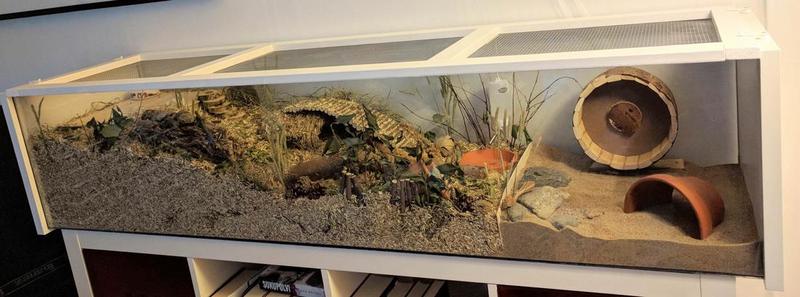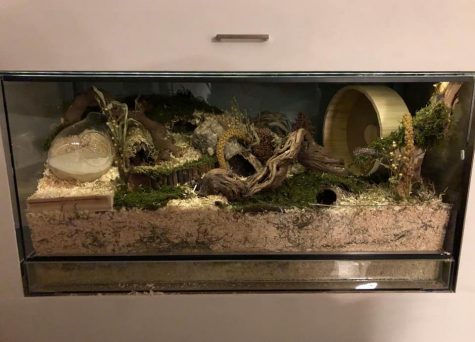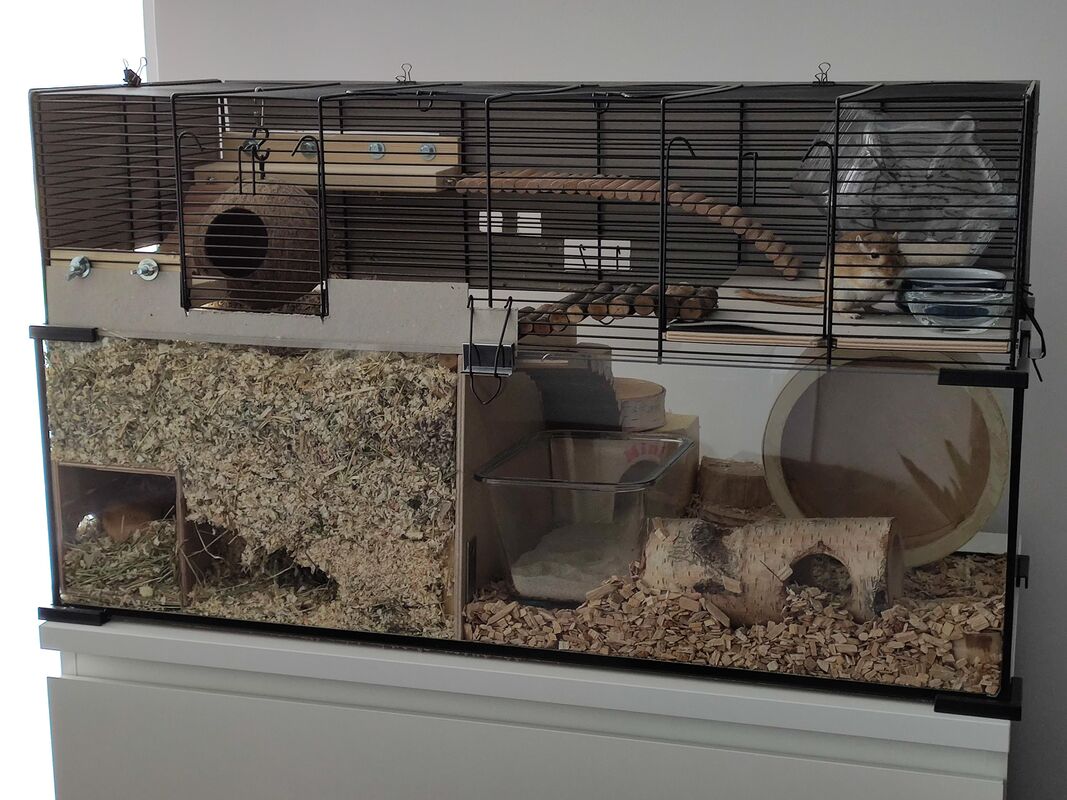General Information:
The most commonly kept pet gerbils are Mongolian gerbils. As their name suggests, they’re found in Mongolia. Gerbils are a social burrowing rodent and live in groups known as ‘clans’. They have an average lifespan of 2-3 years but ages over 4 years have been reported - we’ve only known 5 years.
Mongolian gerbils are largely diurnal, meaning most active during the day, however, they can exhibit crepuscular behaviour, meaning most active around dusk and dawn. They're an omnivorous rodent, meaning their diet consists of both plant-based and meat-based materials.
Care:
Housing/Enrichment:
Mongolian gerbils are known for their burrowing behaviour. We must create a set up that mimics their natural environment and allows them to display natural behaviours. We recommend converting a 4ft or larger glass tank. Gerbils need plenty of suitable substrates - at least 8 inches - to display burrowing behaviour. We mix cardboard, dust-extracted horse shavings, hemp, and hay for the substrate, it is an affordable mixture which creates sturdy burrows.
Gerbils are also known for being relentless chewers. We recommend providing your gerbil with safe wooden toys such as secure housing, bridges, and tunnels. You may provide a solid-floored wooden wheel, but not all gerbils utilise wheels. Gerbils also enjoy sand baths, suitable bathing sand can be found in pet stores and online.
Ideal temperatures are around 18°C-23°C with a humidity level around 30%-50% - avoid excessive humidity levels
Useful Links:
The most commonly kept pet gerbils are Mongolian gerbils. As their name suggests, they’re found in Mongolia. Gerbils are a social burrowing rodent and live in groups known as ‘clans’. They have an average lifespan of 2-3 years but ages over 4 years have been reported - we’ve only known 5 years.
Mongolian gerbils are largely diurnal, meaning most active during the day, however, they can exhibit crepuscular behaviour, meaning most active around dusk and dawn. They're an omnivorous rodent, meaning their diet consists of both plant-based and meat-based materials.
Care:
Housing/Enrichment:
Mongolian gerbils are known for their burrowing behaviour. We must create a set up that mimics their natural environment and allows them to display natural behaviours. We recommend converting a 4ft or larger glass tank. Gerbils need plenty of suitable substrates - at least 8 inches - to display burrowing behaviour. We mix cardboard, dust-extracted horse shavings, hemp, and hay for the substrate, it is an affordable mixture which creates sturdy burrows.
Gerbils are also known for being relentless chewers. We recommend providing your gerbil with safe wooden toys such as secure housing, bridges, and tunnels. You may provide a solid-floored wooden wheel, but not all gerbils utilise wheels. Gerbils also enjoy sand baths, suitable bathing sand can be found in pet stores and online.
Ideal temperatures are around 18°C-23°C with a humidity level around 30%-50% - avoid excessive humidity levels
Useful Links:
- www.ikea.com/gb/en/p/detolf-glass-door-cabinet-white-80269122/
- www.omlet.co.uk/shop/hamsters_and_gerbils/hamster_health/23592/tiny_friends_supreme_science_bathing_sand_1kg?gShoppingPid=23592&gkeyword=&gclid=Cj0KCQjw0K-HBhDDARIsAFJ6UGhrthizzb-Ldxyh9zSO0xCEdHzJLFcEs3IkagVaxZ9y02Cx5jCCCB0aAsV6EALw_wcB
- www.burnhills.com/equestrian-c3/for-the-stable-c12/stable-supplies-c212/bedding-c213/ecoshiv-hemp-shiv-hemp-horse-bedding-aprox-20kg-p4737/s17407?cid=GBP&gclid=Cj0KCQjw0K-HBhDDARIsAFJ6UGibU6800Krjk669tr5zoC8h6QubynvYpqPnnYl1yMX_lIFiSC_9BgcaAmTiEALw_wcB
Diet:
As gerbils are omnivorous, they can eat both plant-materials and meat-materials. There are many unsuitable mixes available for gerbils. anything marketed for multiple species we tend to avoid. Mixes such as bunny nature, and rodipet are high quality, but we also tend to add some pelleted food when feeding for those who are selective eaters.
Our gerbils are fond of treats such as pumpkin seeds, sunflower seeds, mealworms (preferably dried, but they can eat live too – be careful as they bite), and safe forage.
Remember, all treats should be fed in moderation.
Useful Links:
Socialising:
As gerbils are mostly diurnal, you should be able to get plenty of opportunities to socialise with your pet. Some gerbils can be quite quick to handle - particularly when younger.
Be patient and gentle when handling your pet. Never pick your pet up by their tail as this can cause severe injuries.
In the wild, gerbils will live in clans of family members. You must allow your gerbil the opportunity to socialise with their own kind. Pairs are usually more stable than trios, but we've successfully kept many trios too.
In very rare cases, some gerbils will never bond with unfamiliar gerbils and must be kept alone. If you're struggling to bond your gerbil to a new friend, contact a local rescue; they often offer bonding services.
Please feel free to ask more questions
As gerbils are omnivorous, they can eat both plant-materials and meat-materials. There are many unsuitable mixes available for gerbils. anything marketed for multiple species we tend to avoid. Mixes such as bunny nature, and rodipet are high quality, but we also tend to add some pelleted food when feeding for those who are selective eaters.
Our gerbils are fond of treats such as pumpkin seeds, sunflower seeds, mealworms (preferably dried, but they can eat live too – be careful as they bite), and safe forage.
Remember, all treats should be fed in moderation.
Useful Links:
- www.vetsend.co.uk/bunny-nature-gerbil-dream-expert/?var=14084&gclid=Cj0KCQjw0K-HBhDDARIsAFJ6UGhRV0se7S5D9O7eQuddkl6tlb4wJICAO85INUw2bnJh9IjHEpNH1l0aAvDpEALw_wcB
- www.amazon.co.uk/Supreme-Petfoods-Science-Selective-Gerbil/dp/B08974G5R8/ref=asc_df_B08974G5R8/?tag=googshopuk-21&linkCode=df0&hvadid=430754138528&hvpos=&hvnetw=g&hvrand=3383608804106767122&hvpone=&hvptwo=&hvqmt=&hvdev=c&hvdvcmdl=&hvlocint=&hvlocphy=1006648&hvtargid=pla-942905951235&psc=1&th=1&psc=1&tag=&ref=&adgrpid=100431049139&hvpone=&hvptwo=&hvadid=430754138528&hvpos=&hvnetw=g&hvrand=3383608804106767122&hvqmt=&hvdev=c&hvdvcmdl=&hvlocint=&hvlocphy=1006648&hvtargid=pla-942905951235
- www.rodipet.co.uk/pet-foods/rodipet-organic-gerbil-food-senior-500g.html
Socialising:
As gerbils are mostly diurnal, you should be able to get plenty of opportunities to socialise with your pet. Some gerbils can be quite quick to handle - particularly when younger.
Be patient and gentle when handling your pet. Never pick your pet up by their tail as this can cause severe injuries.
In the wild, gerbils will live in clans of family members. You must allow your gerbil the opportunity to socialise with their own kind. Pairs are usually more stable than trios, but we've successfully kept many trios too.
In very rare cases, some gerbils will never bond with unfamiliar gerbils and must be kept alone. If you're struggling to bond your gerbil to a new friend, contact a local rescue; they often offer bonding services.
Please feel free to ask more questions



